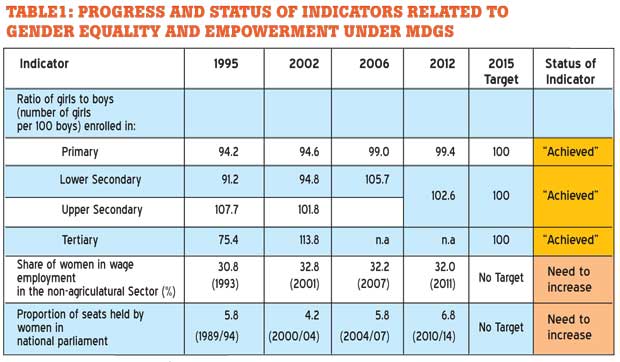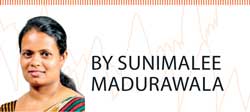08 Mar 2016 - {{hitsCtrl.values.hits}}

 Recognizing women’s struggles, achievements, and contributions in many spheres, the International Women’s Day (IWD) is globally celebrated on March 8 each year. The IWD first emerged from the activities of labour movements at the turn of the 20th century in North America and across Europe.
Recognizing women’s struggles, achievements, and contributions in many spheres, the International Women’s Day (IWD) is globally celebrated on March 8 each year. The IWD first emerged from the activities of labour movements at the turn of the 20th century in North America and across Europe.
This ye ar, the United Nations celebrates the IWD under the theme ‘Planet 50-50 by 2030: Step it up for gender equality’. The aim of the theme is to provide more emphasis on the 2030 Agenda for Sustainable Development and to build momentum for the effective implementation of the Sustainable Development Goals (SDGs).
ar, the United Nations celebrates the IWD under the theme ‘Planet 50-50 by 2030: Step it up for gender equality’. The aim of the theme is to provide more emphasis on the 2030 Agenda for Sustainable Development and to build momentum for the effective implementation of the Sustainable Development Goals (SDGs).
SDG 5: ‘Achieve Gender Equality and Empower All Women and Girls’ focuses on women and their empowerment. As a signatory to the development agenda for post-2015: ‘Transforming our World: The 2030 Agenda for Sustainable Development’, Sri Lanka has the responsibility to work towards achieving the targets proposed under the SDG 5 (See Box 1).
Unfinished agenda 
Although Sri Lanka was able to make remarkable progress in achieving most of the Millennium Development Goals (MDGs) by 2015, the country was unable to attain some crucial indicators related to gender equality and empowerment. Out of the main three indicators under Goal 3 of MDGs, ‘Promote Gender Equality and Empower Women’, Sri Lanka was able to see a satisfactory progress only in one indicator (i.e., ratio of girls to boys enrolled in primary, lower secondary, upper secondary and tertiary levels). The other two indicators related to economic empowerment and political participation of women in the country did not progress as desired (Table 1).
Women’s participation in the labour force has been low in Sri Lanka for a considerable period of time. Limited job opportunities for women, issues related to transport, social attitudes, personal safety and housing, gender wage gap and high work-related costs are some key reasons for this. Sri Lanka Human Development Report 2012 says political parties are the single biggest barrier to women’s greater participation in politics. Political parties as well as the voters prefer males being nominated and elected. Violence involved in the election process is also discourages interested females from actively participating in politics.
Challenges ahead
With this unfinished agenda, achieving the SDG 5 to make a better place for women and girls by 2030 – is definitely a challenge. Among the critical challenges the country has to face are coordination and management of implementation process of SDG 5, awareness creation, generating more sex-disaggregated data and resource allocation.
Facing the challenges
Given that the gender is a cross cutting issue, a well-functioning central coordinating and management mechanism and a separate mechanism to focus only on matters related to SDG 5 are essential elements of successful achievement of SDGs. Proper coordination is required as several parties (ministries, INGOs, NGOs, CBO, etc.) carry out work targeting women and girls.
There may be duplication of work while certain areas may get neglected. Awareness creation should cover all stakeholders along with the encouragement of attitudinal and behavioural changes. The Women and Child Affairs Ministry could play a leading role in this regard, as the Sri Lanka Women’s Bureau, National Committee on Women, as well as the Probation and Childcare Services Department, National Child Protection Authority and Children’s Secretariat fall under this ministry.
Generating and disseminating more sex-disaggregated data is important to reveal the differences between sexes and to reflect problems, issues, and questions related to women and men in society. Further, such data will be essential for effective monitoring. In this regard, national institutions like the Census and Statistics Department should be strengthened and encouraged to collect and disseminate more sex-disaggregated data.
However, the success of overcoming these challenges will depend on the availability of resources and resource allocation. Financial as well as non-financial (human resources, knowledge and skills) resources are needed for the successful implementation of SDG 5. Sufficient resources towards achieving gender equality must be ensured and allocated in the national budget.
Given that investing in gender equality can guarantee the paths to poverty reduction, inclusive growth and prosperity; giving emphasis and priority to making a better place for the country’s women, will benefit the entire nation, leading to sustainable development.
(This article is based on the study by IPS titled ‘National Level Implications of Implementation of SDGs: The Case of Sri Lanka’ funded by the Southern Voice Secretariat)
(Sunimalee Madurawala is a Research Officer at the Institute of Policy Studies of Sri Lanka (IPS). To view the article online and share your comments, visit the IPS Blog Talking Economics - http://www.ips.lk/talkingeconomics/)
26 Nov 2024 42 minute ago
26 Nov 2024 1 hours ago
26 Nov 2024 1 hours ago
26 Nov 2024 2 hours ago
26 Nov 2024 3 hours ago